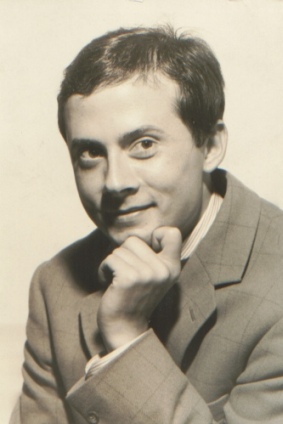|
| ||
|
I might as well look
as alien as possible because it reinforces a point I am making. My whole
thing is that I approach everything as an absolute outsider. It’s the only
way I can break so many rules. Remember, my background is totally strange
- German classical opera. So I was uncertain about coming from that to
rock. It was just as shocking for me to sing opera in a falsetto soprano
in Germany. It was another rule I was breaking. You just didn’t do that.
And I am helped by the fact that pop and rock, which you would think has
no rules at all, is really just as conservative as classical music. So
what I do is doubly shocking. The difference is that punk audiences admire
that I can shock them. Nothing is sacred to me. Who is making the rules
anyhow?
The mix of the classic opulence of opera and the stripped down rawness of New Wave Punk wouldn't seem to make sense on the surface, but then again, the whole aesthetic of Punk was all about being outraged. And what could be more outrageous than Klaus Nomi, flanked by two plastic-wrapped “robots” and accompanied by black masked musicians, singing a mixture of classical arias and 60s pop at Max’s Kansas City, once consecrated by the holy presence of The Velvet Underground and now a venue for the likes of Patti Smith, the Ramones, Talking Heads and The Dead Boys. But Klaus clearly
tapped into a sense of something that was needed at the time, a sense of
showmanship that was missing from Punk and was only just revealing itself
in the New Wave. He was in a way like a gay Alice Cooper, complete with
sets, costumes and make-up, who wasn’t threatening you with blood and gore
and rock and roll death, but putting on a show that reflected the parallel
scenes of Performance Art and Camp theatrics. It was fashion, it was
playfulness, like dressing up in your mother’s clothes.
I just tried to think of him as this alien presence who had
come to earth to unite these people that were kind of like fashion victims
and disco outcasts, and make them be sort of like the foam that was going
to rise to the surface of humanity if they joined forces.
But he brought in all the classical stuff. He knew about
that music. He knew what his voice was capable of. I mean the Cold Song, I
think is, the thing he’s most remembered for, actually, in retrospect.
Even more than Samson and Delilah. And, you know, it’s just a complete,
pristine, beautiful moment in music. But I think Lightning Strikes, it was
the one that was the most warmly received when we played live, ‘cause
everybody knew it. And he got to sing way up high...
He
was “the emissary from space” in The Nomi Song, waving his six arms like
an Indian demi-god or the chief Martian in Invaders From Mars. He
deconstructed The Twist dressed in a Dracula cape as he directed the
movements of a life-sized robot - his “little sis”, and mesmerized his
audience with twirling hypnotic spiral umbrellas while singing Lightning
Strikes. He spun around in a painted wooden ball gown on wheels making an
operatic mockery of the disco hit I Feel Love (I Feel Sick). He sang
Falling In Love Again dressing in his signature triangular vinyl tuxedo
with an arrangement that owed more to David Bowie than Marlene Dietrich
and then left his audiences speechless with aria from Saint Saens,
complete with smoke bombs and sci-fi sound effects. And if it was all
thrown together from clip lights, plastic wrap, bed sheets and assorted
junk, so much the better for theatrical illusion which owed as much to
Bauhaus, expressionism and opera as it did to cartoons, comic books and
50s sci-fi films.
|
Klaus Sperber, however, came from in a small city in what was then West Germany, a child of the Second World War. The Nomi Mythos relates that he began his career singing in the Deutsche Oper in Berlin. Truth be told, any singing he did was after the show, while sweeping up with his fellow ushers. His aunt relates that he came from a family that was always singing, “even while vacuuming the house or whatever”. Like a whole generation of rockers who learned to play music as kids by copying their favorite records, Klaus learned to sing from listening to albums by Maria Callas. While the other kids listened to Armed Forces Radio and wanted to be Elvis, when Klaus grew up, he wanted to be a soprano - and Elvis. Needless to say, at the music conservatory he attended in Berlin they didn’t know what to do with him. He also didn’t know what to do with himself. After hanging around Berlin for a few years, singing arias in drag at a local gay club, an infatuation with an American boy took him to New York - where he hung around for five years doing odd jobs, feeling alienated and going nowhere. But New York at that time was THE place for being alienated. In the punk scene, nowhere was all, being miserable was cool and the emptiness of hanging around had been transformed into the activity of hanging out. Being disaffected now had an outlet. The world had been reduced to this tiny little village that seemed in constant revolt against sameness and ordinariness and it was all about "Fuck that. Let's do anything that isn't that." It was all about re-invention. Re-invention of style, re-invention of music, re-invention of one's self. It was not necessary to know what you were doing, as long as you were out there doing it. No one was waiting around for Andy Warhol’s “15 minutes of fame”. Anyone could, and did, become a "personality". They were changing their names and becoming Richard Hell, Johnny Thunders, James Chance, Nick Zedd, and Lydia Lunch. So out of all of this Klaus developed into another one of the neighborhood freaks, effecting a look of a sort of androgynous android chic. A guy with a vague ambition to be an opera singer, he still didn’t know what he was doing, but he did know where he was going - out. The NY club scene had evolved into a big playhouse. It was a time full of music and creativity, and if the talent pool was not the biggest, at least there was boundless energy. There was always something going on - and there was a purpose...
...everything was a huge movement against slickness of the
70s in rock and roll. There was this siege mentality artistically, it was
as if this fucking Disco music is taking us over, it was just sucking the
oxygen out of the world and there was this mentality like we’ve got to do
something - anything! ...and so everybody did do anything and everything
was ok and everything was possible and...the more wacky it was, the better
it was. So in the midst of all this, a couple of kids from the scene, Susan Hannaford and Tom Scully, found an old Polish wedding hall and decided to put on a show. The New Wave Vaudeville presented an assortment of local talent and popular no-talent that already had its built in audience within the scene. It turned out to be a landmark event for a number of reasons, but who could have known that at the time? Anyway, on opening night, it seemed like “everybody” was there and they were all ready to enjoy an evening of weird and silly fun. What they weren’t ready for was Klaus, dressed as a space man, singing in a soaring counter-tenor voice - totally serious. “We were sitting up in the dressing room and all of a sudden
the rock and roll stopped and this craziness stopped and someone was
saying you gotta see this! And I remember running downstairs and standing
in the balcony and there was Klaus standing in a blue pool of light and
dry ice and smoke all over the stage in a clear vinyl cape singing a piece
from Samson and Delila. And I thought what the fuck is this?! Something
had just landed on this planet and I thought, this guy’s not lip synching,
this guy’s not a drag queen, he’s really doing this - wow!”
That night was like breaking free - the minute that Vaudeville show was done, he had broken free from Klaus Sperber, and he remained Klaus Nomi till he died. - Andrew Horn
| |



